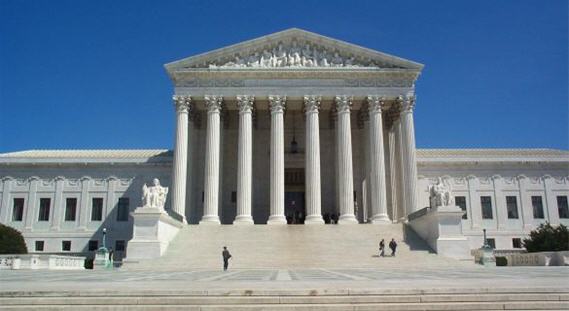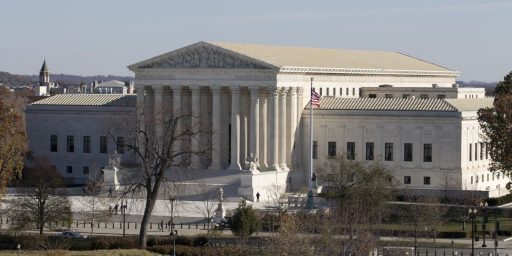SCOTUS Makes It More Likely Immigration Appeal Can Be Heard And Decided By June
After requesting a 30 day extension to reply to the Federal Government's request for appeal in the case challenging President Obama's immigration executive action, the states get only eight days.
As I noted late last month, the Obama Administration had appealed the Fifth Circuit Court of Appeals decision upholding an injunction on President Obama’s immigration executive action provisions that purported to extend protection to a wider group of people in the country illegally to the Supreme Court. Initially, Texas and the other states on the other side of the case had asked the court for an extension in responding to the Administration’s petition that, if granted, would have made it difficult if not impossible for the Court to hear the case in time to be decided by the end of the current term. Yesterday, though, the Justices granted the states’ request for an extension but for a much shorter period than requested, a sign that the Justices would want this case heard during the current term if they do end up accepting it for appeal:
The Supreme Court handed the Obama administration a procedural but important victory Tuesday in its efforts to get the justices to rule next year on President Obama’s plan to shield millions of illegal immigrants from deportation.
The court rejected a request from Texas and other states for a 30-day extension to file legal briefs in support of the lawsuit to block the immigration plan. If granted, the extension would have made it very unlikely that the court could hear the case during its current term.
Instead, the justices accepted the Justice Department’s request for a shortened eight-day extension, meaning that if the court decides to take the case, a decision would probably come by late June. A victory for the government would allow it to start enrolling immigrants in the program before the president leaves office in January 2017 — an outcome the administration has been seeking with heightened urgency.
The court is not expected to decide until January whether to take the case. If it does, the decision would come in the heat of the 2016 presidential campaign. Immigration policy and Obama’s efforts to protect immigrants already living in the United States have emerged as heated campaign topics.
The legal and political debate centers on Obama’s plan, announced in November 2014, to allow millions of undocumented immigrants to live and work in the United States for three years without fear of deportation. The program, known as Deferred Action for Parents of Americans and Lawful Permanent Residents (DAPA) allows parents of U.S. citizens to apply for work permits, provided they have lived in the country for at least five years and pass required background checks.\
Obama has made reforming the immigration system a top second-term priority, and he acted unilaterally after Republicans in Congress blocked a comprehensive bill. But a federal judge in Texas blocked his immigration program in February after Texas and 25 other states sued the administration, calling the moves unconstitutional.
The U.S. Court of Appeals for the 5th Circuit last month upheld the injunction preventing the deferred-action program from taking effect, prompting the administration to seek Supreme Court review. Administration officials said they are hopeful that a victory at the high court in June would give them enough time to launch the program with Obama still in office.
As SCOTUSBlog’s Lyle Denniston notes, the idea for an eight day extension appears to come directly from the U.S. Solicitor General Donald Verrilli, who said in a filing in response to the request for an extension that that if the Court gave the states that eight day extension then the Federal Government would agree to waive its right to file a Reply Brief. That move would significantly shorten the time in which the case would be ready for the Justices to consider whether or not to take the case and make it far more likely that, if they did accept it, it would be possible to fully brief and argue the case in time for it to be considered the term and a decision issued by the end of the current term in June.
Think Progress’s Ian Millhiser sees this development as a bit of good news for the Obama Administration in connection with a case where they have suffered a series of losses, and I have to largely agree. Granting this short extension does not give us any indication, of course, as to how the Court might actually rule on the merits of this case, and it doesn’t even necessarily tell us whether or not it would take the case at all. What it does tell us, though, is that at least some core group of Justices wants to have the time to consider the petition from the Federal Government during a time period in which it would be possible to grant the appeal, allow the case to be fully briefed, and hear and digest arguments, in time for the case to be decided by the end of June. While it’s impossible to know exactly why they may be leaning in this direction, the fact that this appeal involves the granting of an injunction and that further proceedings below are effectively if not officially delayed until the Justices have ruled on the Obama Administration’s petition may in part be motivating the Justices to get the uncertainty about an appeal to the Supreme Court out of the way soon rather than leaving it as something that could hang over the case until well into the fall of next year if the matter has to be punted to the term that begins October 2016.
If the Court does take this case early next year, it would join a whole host of other cases on issues ranging from Affirmative Action, to abortion, reapportionment, and yet another case about religious liberty and the PPACA’s contraceptive mandate that the Justices will be considering and ruling on while the 2016 Presidential race unfolds over the coming months. No doubt, each of these cases and others will provide political fodder for candidates on both sides of the aisle, especially since there are presently three Justices who will be at or above 80 years of age by the time the 2016 election rolls around, and one more who will be above 75. Just by the sheer numbers, it is anticipated that the next President will have the opportunity to appoint at least one, and possibly as many as three or four, Justices to the nation’s highest court depending on how many terms they end up serving. That fact, combined with the hot button political issues that the Court has dealt with in the past few years, and those it is dealing with during this term, suggests that the Supreme Court is likely to be a big issue in the election as the race goes forward.





